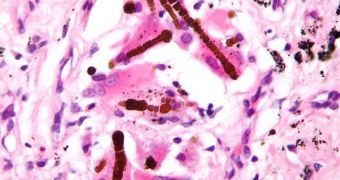A new genetic mutation has been linked to a potentially novel therapy against squamous cell lung cancer. Researchers say that patients who have this mutations may respond to a drug that was until now used to treat chronic myelogenous leukemia (CML).
The chemical is a tyrosine kinase inhibitor-class substance, but investigators have recently determined that it could also be used to address squamous cancer cells as well. However, the chemical has no effect for patients without the mutation.
The new research was carried out by experts at the Dana-Farber Cancer Institute, who investigated a gene called DDR2. They found that a very specific mutation on this gene, which affects around 3 percent of people suffering from this type of lung cancer, renders tumor cells vulnerable to dasatinib.
According to the research team, this again highlights the need for more research to be conducted in the field of personalized medicine, which is the science of tailoring drugs and therapies precisely for the need of each individual patient.
Administering drugs such as dasatinib to all lung cancer patients would literally have no effect, if those receiving it do not have the DDR2 mutation. On the other hand, testing the cancer sufferers before treatment is prescribed could help doctors make better decisions.
This could contribute to increasing the number of cases of successful recoveries from lung cancer, experts say. Personalized medicine is currently a goal in a variety of research fields connected to medicine. Experts are beginning to realize that a uniform approach is incomplete.
Details of the new research were presented on Sunday, April 3, at the 102nd annual meeting of the American Association for Cancer Research (AACR). A paper detailing the work appears in the first issue of the new medical journal Cancer Discovery.
Dana-Farber Cancer Institute professor of pathology Matthew Meyerson, MD, PhD, says that squamous cell lung cancer currently has no dedicated therapies, to set it apart from regular lung cancer.
The expert, who was also the lead researcher on the new investigation, says that more than 50,000 people develop this condition every year, and that about 1,000 to 2,000 of them have the DDR2 gene mutation, AACR reports.
“As a percentage of the millions of people who get cancer each year it is small, but cancer therapy is going more in the direction of personalized medicine as we learn more and more about the complicated biology of each tumor,” the expert said at the conference.
“Dasatinib is an existing therapy for chronic myelogenous leukemia with a long history and a strong safety profile. The results of this study clearly encourage a clinical trial to test dasatinib in the setting of squamous cell lung cancer,” the investigator concludes.

 14 DAY TRIAL //
14 DAY TRIAL //